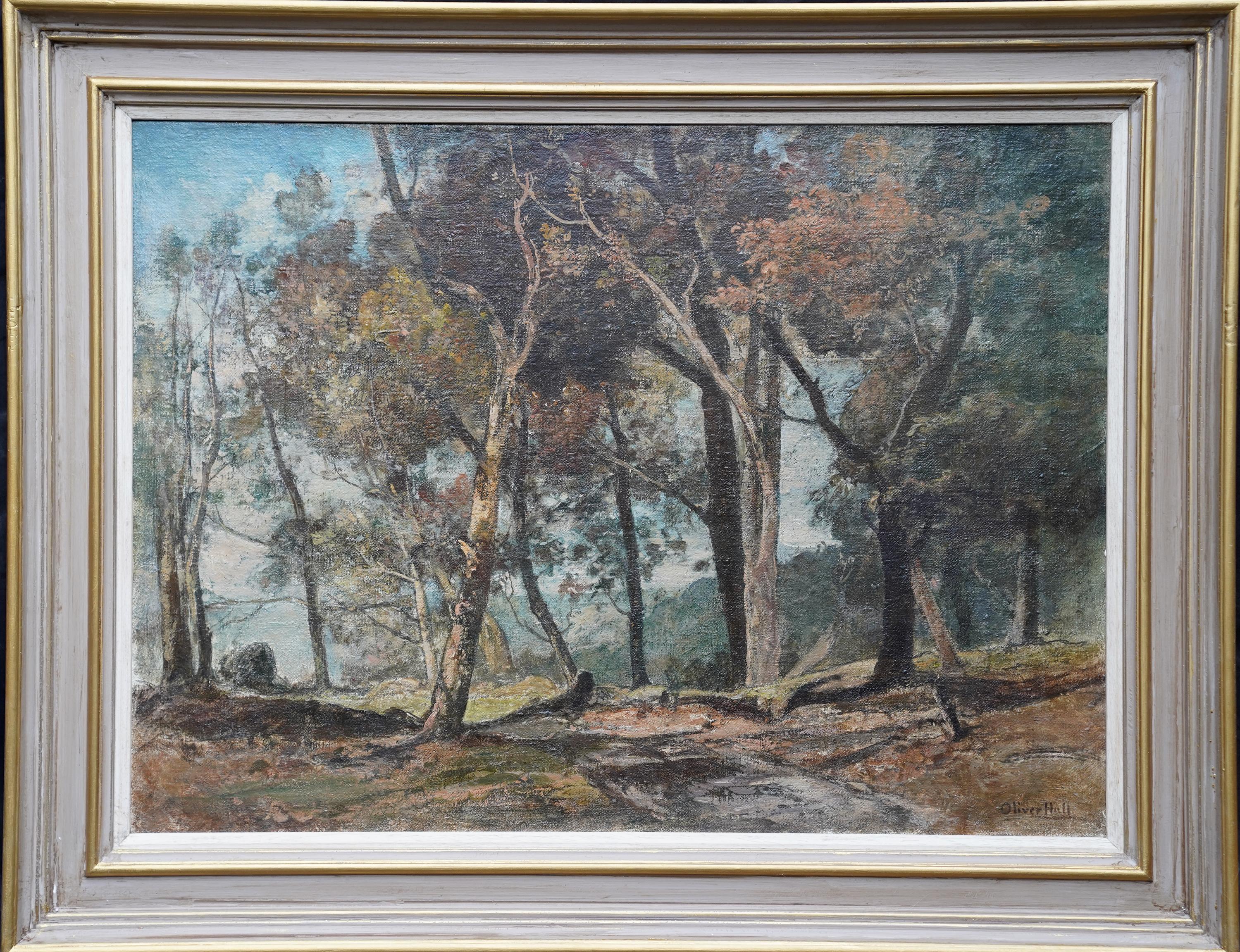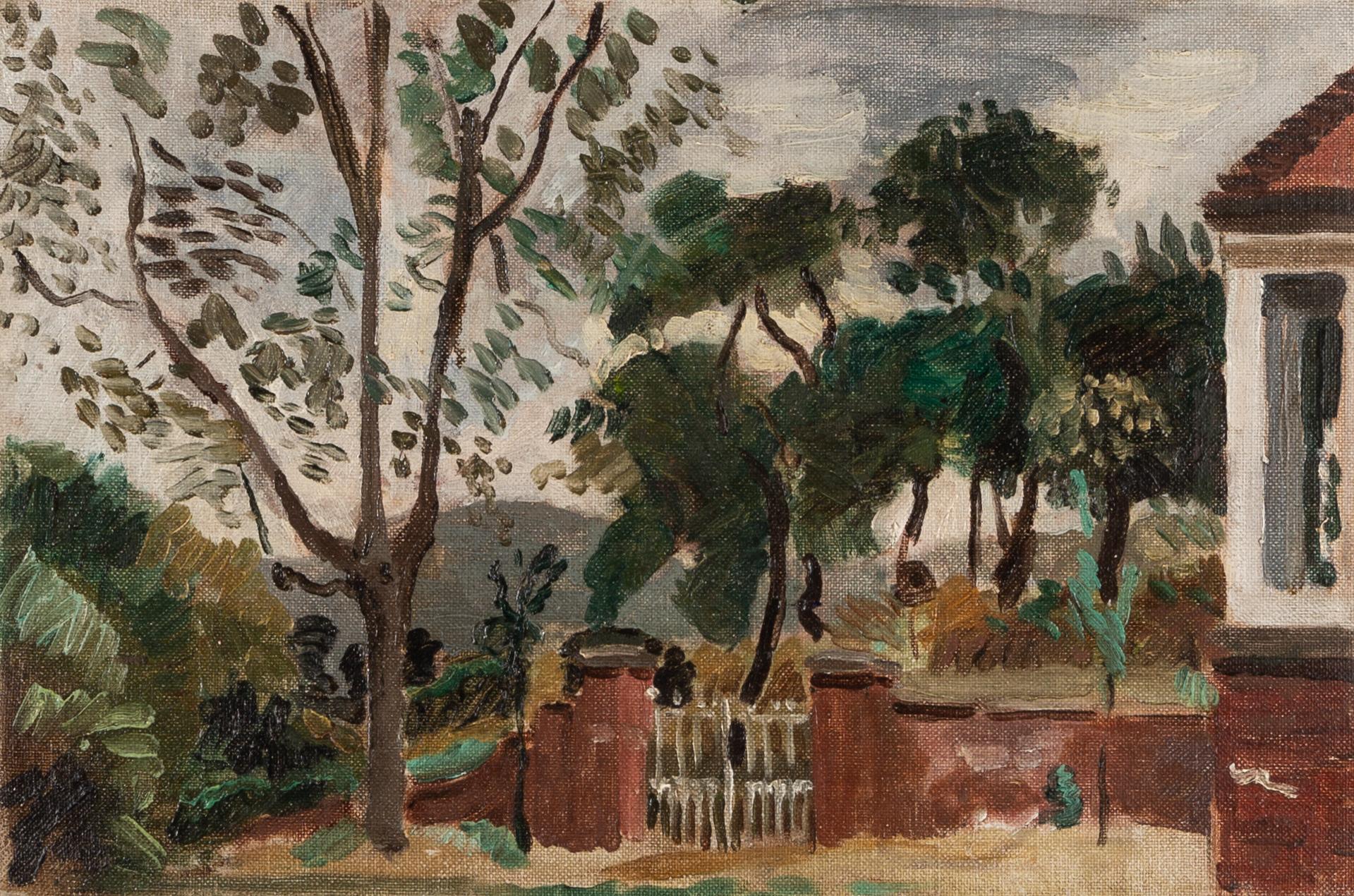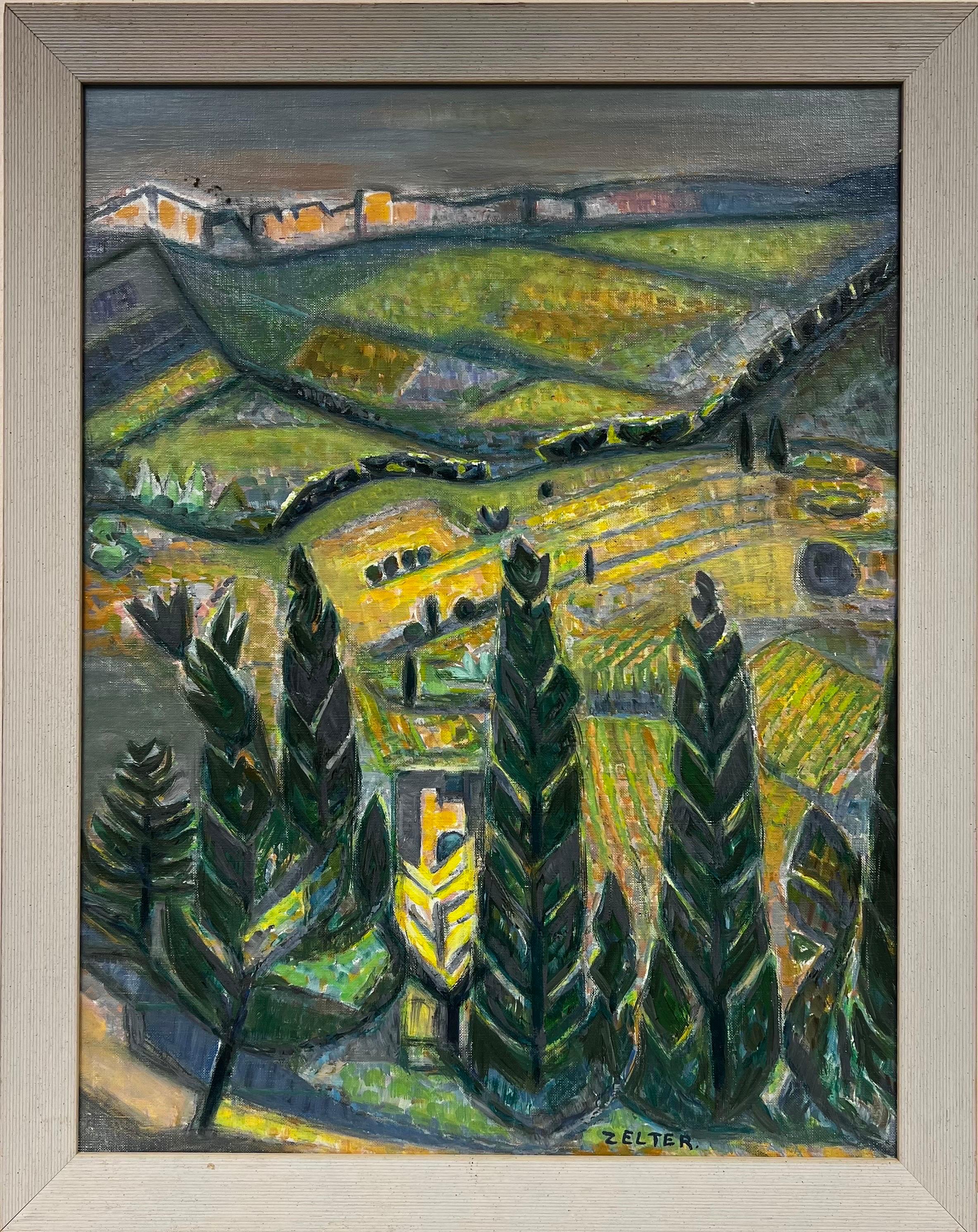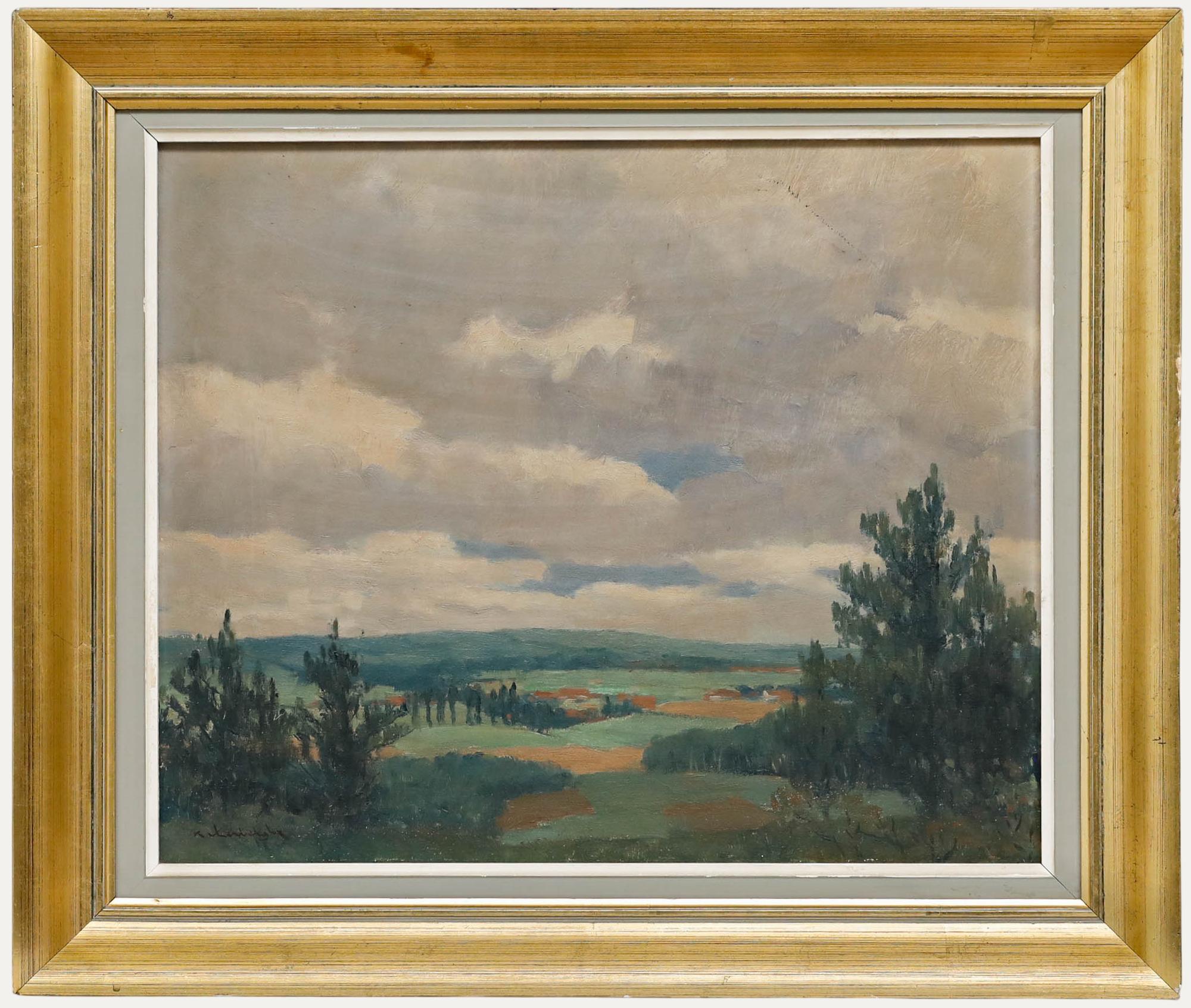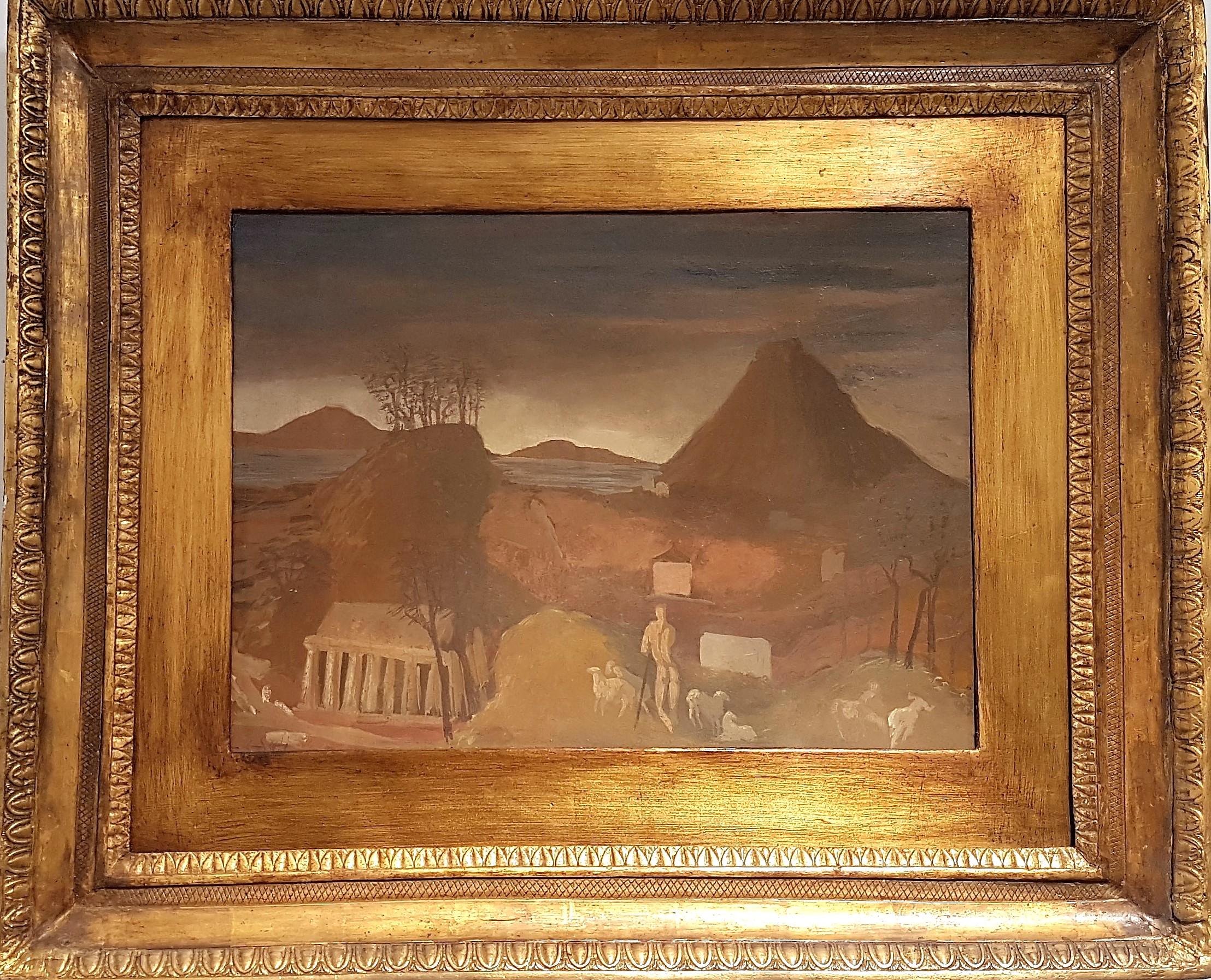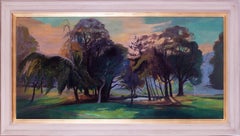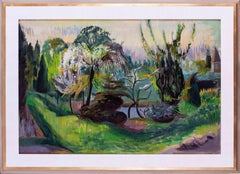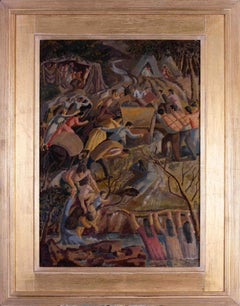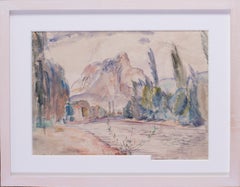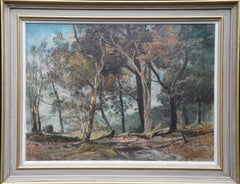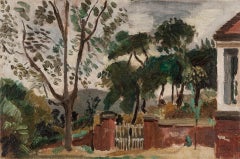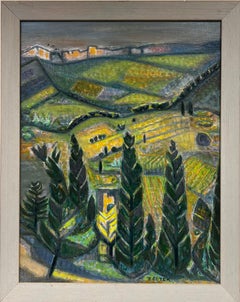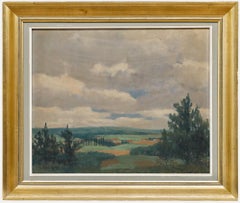Items Similar to Roger Fry original landscape oil painting, with provenance, 'Sous Bois', British
Want more images or videos?
Request additional images or videos from the seller
1 of 11
Roger FryRoger Fry original landscape oil painting, with provenance, 'Sous Bois', British
$14,386.75
£10,500
€12,247.68
CA$19,706.25
A$21,917.65
CHF 11,444.72
MX$266,714.51
NOK 146,166.50
SEK 137,078.39
DKK 91,409.16
Shipping
Retrieving quote...The 1stDibs Promise:
Authenticity Guarantee,
Money-Back Guarantee,
24-Hour Cancellation
About the Item
Roger Eliot Fry (British, 1866 – 1934)
Sous bois
oil on canvas
23.1/2 x 28.5/8 in. (59.7 x 72.8 cm.)
Provenace: Magdalene Street Gallery, Cambridge
The collection of Oliver Carey
A champion of Post-Impressionism, Roger Fry believed form, not subject matter, should be the primary expressive element in art. Roger Fry’s appreciation of, and efforts to promote Post-Impressionist art were key to introducing Britain to recent developments in European art.
Fry curated two Post-Impressionist exhibitions in London, the first in 1910 and the second in 1912, with the intention of showing the ways in which Impressionism had expanded and developed from its French origins and taken root in other countries, specifically in England. The work of French artists such as Cézanne, Bonnard and Matisse were juxtaposed with that of a new generation of British artists made in response to art made on the Continent. Fry’s intention was to show the artistic and cultural exchange between Great Britain and mainland Europe.
One of Fry’s ambitions was to encourage a better appreciation of Cézanne’s achievements and he was the first British critic to champion his work. Fry’s 1927 study, Cézanne, remains the supreme introduction to a painter he regarded as the ‘greatest master of modern times’. On a trip to France in October 1919, Fry spent time in Cézanne’s hometown of Aix-en-Provence, the surrounding areas painted by the artist, and his house, the Jas de Bouffan. The magnificent countryside inspired Fry to paint, and led him to declare Cézanne a ‘pure naturalist’.
Fry believed form, not subject matter, should be the primary expressive element in art. Cézanne’s aims closely aligned with Fry’s ideal, as it gave formal expression to nature. In his 1927 study, Fry asserts that Cézanne’s art is the antithesis of the abstraction of Cubism, constantly questing instead to explore the inner face of nature. He also notes the artist’s powers as a colourist as among the supreme aspects of his genius.
Typical of Cézanne’s style, according to Fry, are the pulsating rhythms and constructed strokes that create geometric forms. According equal emphasis to all areas of the canvas, the entire picture surface is imbued with ‘the vibration and movement of life’. In one passage, Fry writes ‘Cézanne reduces actual objects to pure elements of space and volume. In their abstraction, the objects are then brought back into the concrete world of real things by expressing them in an incessantly varying and shifting texture. They retain their abstract intelligibility and regain that reality of actual things which is absent from all abstractions.’
For all his academic influence, however, Fry primarily saw himself as an artist. His championship of Post-Impressionism was accompanied by a dramatic change in his own painting, becoming more experimental in style. His landscapes are arguably Fry’s most notable contribution to English Post-Impressionism, in which trees are ground down to the simplest geometrical shapes and clouds stalk the skies. He was interested in the capturing of light and mood of places, and his desire for clear-cut shapes and colours is expressed in sturdy geometric shapes.
Fry was a regular visitor to southern France for much of his life. He had great admiration for its various landscapes, for the light and colours of the Midi, for the lifestyle and customs of its inhabitants, its broadly democratic attitude to culture, its architecture and artistic heritage. His extensive trips deepened his love of Provence, where he was eventually to buy a farmhouse. In 1931 he acquired Mas d’Angirany, on the Route d’Antiques leading out of St Remy-de-Provence, which he shared with Charles and Marie Mauron. It was surrounded by olive groves and the upper floor looked across to Les Alpilles, extraordinary geological formations that have been weathered into grotesque shapes and pitted by ravines that have cut their way through the rocks. Vincent Van Gough’s Ravine, painted shortly after his arrival at the Saint-Paul asylum in 1889, depicts a nearby ravine in Saint-Remy; a possible inspiration for Fry’s later production of a similar scene.
Frances Spalding has written:
"Some of Fry’s most lyrical late landscapes, with their observation of flickering light an intense responsiveness to the spirit of the place, were painted in the area in and around St Remy."
Until the end of his life, Provence would remain Fry’s favourite part of France. It was a painter’s love, ultimately visual.
- Creator:Roger Fry (1866-1934, British)
- Dimensions:Height: 23.5 in (59.69 cm)Width: 25.63 in (65.11 cm)Depth: 1 in (2.54 cm)
- Medium:
- Movement & Style:
- Period:
- Condition:Please ask dealer for further details on condition.
- Gallery Location:Petworth, GB
- Reference Number:1stDibs: LU540315739392
About the Seller
4.9
Gold Seller
Premium sellers maintaining a 4.3+ rating and 24-hour response times
Established in 2010
1stDibs seller since 2017
267 sales on 1stDibs
Typical response time: 10 hours
- ShippingRetrieving quote...Shipping from: Petworth, United Kingdom
- Return Policy
Authenticity Guarantee
In the unlikely event there’s an issue with an item’s authenticity, contact us within 1 year for a full refund. DetailsMoney-Back Guarantee
If your item is not as described, is damaged in transit, or does not arrive, contact us within 7 days for a full refund. Details24-Hour Cancellation
You have a 24-hour grace period in which to reconsider your purchase, with no questions asked.Vetted Professional Sellers
Our world-class sellers must adhere to strict standards for service and quality, maintaining the integrity of our listings.Price-Match Guarantee
If you find that a seller listed the same item for a lower price elsewhere, we’ll match it.Trusted Global Delivery
Our best-in-class carrier network provides specialized shipping options worldwide, including custom delivery.More From This Seller
View AllWoodland pond landscape painting by female 20th C artist Phyllis Bray
Located in Petworth, West Sussex
A really luscious and colourful woodland landscape oil painting by Modern British female artist Phyllis Bray, 1930s.
Phyllis Bray (30 August 1911 – 1991)...
Category
20th Century Modern Landscape Paintings
Materials
Canvas, Oil
Lakeside landscape by British female mid 20th Century artist Phyllis Bray
Located in Petworth, West Sussex
A really beautiful and large example of British 1930s painting by female artist Phyllis Bray. Bray was a British artist and illustrator known for her inv...
Category
20th Century Modern Landscape Paintings
Materials
Canvas, Oil
British 20th Century oil painting of 'The promised land' by Thomas Saunders Nash
Located in Petworth, West Sussex
THOMAS SAUNDERS NASH (1891-1968)
The promised land
Oil on board
28 x 20 in. (71 x 50.8 cm.)
Painter of figure compositions, religious subjects, l...
Category
20th Century Expressionist Figurative Paintings
Materials
Oil, Board
Leon Underwood, British 20th Century summer landscape
By Leon Underwood
Located in Petworth, West Sussex
Leon Underwood (British, 1890 – 1975)
A River landscape in Italy
Signed, inscribed indistinctly and dated ’25.
Watercolour on paper
10.5/8 x 14.1/2 in. ...
Category
20th Century Abstract Landscape Drawings and Watercolors
Materials
Paper, Watercolor
British, 1922, gouache landscape by Sir William Rothenstein
By Sir William Rothenstein
Located in Petworth, West Sussex
Sir William Rothenstein (British, 1872-1945)
Mountain landscape
Signed and dated `W. Rothenstein 22’ (lower right)
Gouache
20.3/8 x 15 in. (51.8 x 38 cm.)
Provenance: Christie’s London, Modern British Paintings, 31 October 1996, lot 2
The English portrait artist Sir William Rothenstein was born January 29, 1872, near Bradford, Yorkshire. William Rothenstein was the son of Moritz Rothenstein, who came to England from Hanover in 1859, and the brother of Charles Lambert Rutherston, the collector, and Albert Daniel Rutherston, the artist. William Rothenstein studied for one year at the Slade School in London under Alphonse Legros, after which he spent four years in Paris, where he attended the Académie Julian. While in Paris, Rothenstein met many of the important artists of the time; he was particularly influenced by James Whistler, Edgar Degas, and Henri Fantin-Latour. After his return to England in 1893, Rothenstein was commissioned by John Lane...
Category
20th Century English School Landscape Drawings and Watercolors
Materials
Paper, Gouache
Post Impressionist French oil painting of a landscape with dolman by Jean Dulac
Located in Petworth, West Sussex
A very attractive Post Impressionist landscape painting with a dolman by Lyonnais artist Jean Dulac.
Jean Dulac was born on Bourgoin but from the age of 5 ...
Category
20th Century Post-Impressionist Landscape Paintings
Materials
Oil, Board
You May Also Like
Woodland Path - British Impressionist art 1930 wooded landscape oil painting
By Oliver Hall, R.A., R.E., R.S.W.
Located in London, GB
This lovely Impressionist landscape oil painting is by prolific exhibitor and British artist Oliver Hall. Painted circa 1930 the composition is a path curving through some trees with...
Category
1930s Impressionist Landscape Paintings
Materials
Oil
The Country House, 1926 circa - 20th Century Landscape Oil Painting with Trees
By Adrian Daintrey
Located in Kingsclere, GB
Adrian Daintrey was born in Balham, London on 23 June 1902, the youngest of three children of Ernest Daintrey, a solicitor and his wife Lucy Mary (née Blagdon). He was educated at Ch...
Category
Early 20th Century Landscape Paintings
Materials
Canvas, Oil, Board
20th Century French Modernist Signed Oil Provence Landscape, framed
Located in Cirencester, Gloucestershire
Artist/ School: French School, late 20th century, signed
Title: Provencal Landscape
Medium: oil on canvas, framed
Framed: 28.5 x 22.5
Canvas : 24 x 19 inches
Provenance: privat...
Category
Late 20th Century Modern Landscape Paintings
Materials
Oil
Karel Van Lerberghe (1889-1953) - 1940 Oil, Landscape with Houses & Trees
Located in Corsham, GB
A fine study by Van Lerberghe depicting a serene landscape with distant hills under a cloudy sky. Well presented in a gilt-effect frame. Inscribed to the reverse with the title and d...
Category
Mid-20th Century Landscape Paintings
Materials
Oil
Village Gossip - British early 20th century art wooded landscape oil painting
By Joseph Vickers De Ville
Located in London, GB
This lovely oil painting is by noted 19th century born Wolverhampton artist Joseph Vickers De Ville. The Wolverhampton gallery is home to many of his works, some of which are usually...
Category
Early 20th Century Realist Landscape Paintings
Materials
Oil
Landscape - Original Oil on Cardboard by Corrado Cagli - 1932 ca.
By Corrado Cagli
Located in Roma, IT
Signed lower left.
On rear: "Corrado Cagli Via Ludovico Muratori 27 Roma o Via Imbonati 17 Milano" "Paese" - hand written by the artist.
Painting in which Corrado Cagli, a key exponent of the so called "Scuola Romana...
Category
1930s Modern Landscape Paintings
Materials
Oil
More Ways To Browse
Cubism Original Painting
Original Cezanne
Original Paul Cezanne
Vintage Aix
Grotesque Face
Matisse Faces
Vintage Weather House
Modern Farmhouse Painting
Oliver Charles
Roger Fry
Salvador Mexican
Battle Ship Paintings
British Sheep Painting
C Frederick Oil Painting
English Landscape Paintings Of Bridges
French Sheep Painting
Maine Coast Oil Painting
Navajo Art Painting
